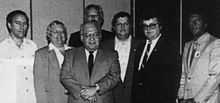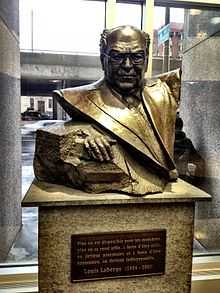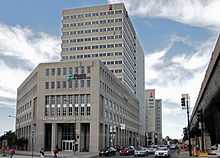Fonds de solidarité FTQ
 | |
| Company created by special legislation | |
| Industry |
Development capital Venture capital Business financing |
| Founded | June 23, 1983 |
| Headquarters | Montreal, Quebec, Canada |
Area served | Quebec |
Key people |
Gaétan Morin President & CEO |
| Products | Registered Retirement Savings Plan |
| Website | www.fondsftq.com |
The Fonds de solidarité FTQ (“Fonds”) is a Québec development capital organization whose overriding mission is to invest in local businesses to further the economic development of all the regions of Québec.
Created by the Fédération des travailleurs et travailleuses du Québec (FTQ), Québec’s largest labour body, the Fonds de solidarité FTQ was created on June 23, 1983 through legislation enacted by the province’s National Assembly.
As of May 31, 2014, the Fonds held $10.1 billion in net assets, had 613,958 owner-shareholders, and had helped create, maintain and protect 172,000 jobs.[1]
History


- 1981 : Beginning of an economic crisis that would last 18 months and see business interest rates climb to 25%.
- 1982 : Québec Summit: The FTQ looks for ways to save jobs.
- June 1982 : Launch of the Corvée-Habitation project, a partnership between construction workers, unionized workers, businesses and governments that would save over 57,000 jobs during the three-year economic crisis and give homebuyers access to financing below the market rate.
- September 1982 : Denis de Belleval writes 20-page report to propose creation of a 750 M$ fund much like the one later proposed by FTQ.[2]
- October 1982 : Closure of several plants in Sept-Îles that had been bought out by workers to save their jobs. Facing bankruptcy, workers not only lost their savings but their livelihoods as well.
- April 1983 : Louis Laberge convinces the FTQ General Council to create the Fonds in order to share the risk and make investments in SMEs in order to create and maintain jobs.
- June 1983 : The Fonds de solidarité FTQ is created through Bill 192. Louis Laberge declares, “The Fonds will be a profitable entity, not a charitable organization or a subsidy agency.”
- June 1983 : The Québec and federal governments each contribute $10 million to launch the Fonds.
- December 1984 : The Fonds makes its first investment: $500,000 in Scierie des Outardes.
- January 1985 : The Fonds launches its first advertising campaign for its RRSP.
- February 23, 1985 : First Annual Meeting of Shareholders.
- 1986 : Introduction of economic education for workers.
- 1990 : Creation of SOLIM, a real estate investment fund known today as Fonds immobilier de solidarité FTQ.
- 1990 : The Fonds teams up with the Union des municipalités régionales de comté (UMRCQ) to create société en commandite SOLIDEQ, charged with creating the SOLIDES, today known as the Fonds locaux de solidarité FTQ [local solidarity funds].
- 1996 : Creation of the Fonds régionaux de solidarité FTQ [regional solidarity funds].
- 1997 : Raymond Bachand replaces Claude Blanchet as President and CEO.
- 1997 : Introduction of the Shareholder’s Booklet.
- 1998 : The Fonds celebrates its 15th anniversary.
- 1999 : Henri Massé becomes President of the FTQ and Chairman of the Fonds.
- 2000 : Over 20% of Canada’s venture capital is managed by the Fonds.
- 2002 : Pierre Genest becomes President and CEO.
- 2002 : Net assets reach $4.5 billion.
- 2002 : Shareholder base surpasses 500,000.
- 2005 : Québec’s Department of Finance announces changes to the Fonds’ investment rules, allowing it to increase its investments in larger companies.
- 2006 : Yvon Bolduc takes over the helm at the Fonds.
- 2009 : The Fonds becomes a signatory to the United Nations Global Compact.
- 2010 : The Fonds joins the Global Reporting Initiative (GRI).
- 2011 : Net assets reach $8.2 billion.
Network
Headquartered in Montréal, the Fonds de solidarité FTQ has a network of independent organizations that includes the Fonds régionaux de solidarité FTQ [regional solidarity funds], the Fonds locaux de solidarité FTQ [local solidarity funds] and the Fonds immobilier de solidarité FTQ [real estate solidarity fund]. Its investment network also includes 80 specialty funds.
Found across all the regions of Québec, the 16 Fonds régionaux can make investments of up to $2 million.
Managed by the CLD (Centre local de développement) [local development centre], the 87 Fonds locaux make investments of up to $100,000 in partnership with the Fédération Québécoise des Municipalités.
The Fonds immobilier de solidarité FTQ invests in real estate projects.
Mission

The Fonds’ core mission is to further Québec’s economic growth by creating and protecting jobs through investments in local businesses across all sectors of the economy. Part of its mission is also to encourage its owner-shareholders to save for retirement and to provide them with a reasonable return, which is in addition to the tax benefits granted by the two levels of government.
Constituting act
The Fonds de solidarité FTQ was constituted on June 23, 1983 by an act of the Québec National Assembly, then headed by the Lévesque government. The Fonds’ objectives are to:
- invest in companies that have an economic impact in Québec and provide them with services that will assist their development and create, maintain and protect jobs.
- promote programs to educate workers on economic matters so that they can have a greater impact on Québec’s economic development;
- stimulate the Québec economy by making strategic investments that will benefit workers and businesses alike;
- further the development of eligible businesses by inviting workers to do their part by purchasing Fonds shares.
Most of the Fonds’ investments take the form of unsecured loans in Québec small and mid-sized enterprises (SME).
60% rule
In keeping with its mission, the Fonds makes investments in all types of businesses, with or without a guarantee. However, in any given year, the proportion of unsecured investments in eligible companies must represent, on average, at least 60% of its average net assets of the previous year.
Business financing
For the year ended May 31, 2011, the Fonds had invested $733 million in Québec companies. It is a partner, either directly or through one of its network members, in over 2,000 Québec businesses.
The only development capital organization with sector expertise, the Fonds invests in the most important sectors of the Québec economy.
As at May 31, 2011, the Fonds had $5.2 billion invested in 2,129 Québec companies. Since 1983, the organization has invested $9.8 billion.
Sector expertise
The Fonds de solidarité FTQ specializes in 25 sectors of the Québec economy:
- Aerospace
- Agri-food
- Wood
- Chemical
- Construction and construction material
- Culture
- Distribution and consumer goods
- Social economy
- Environment
- Printing machinery and equipment
- Transportation equipment and automobiles
- Furniture and fixtures
- Mining
- Pulp and paper
- Plastics
- Metal products
- Leisure tourism
- Life sciences
- Business services
- Transportation services
- Financial services
- ICT
- Textiles
- Business transfers
RRSP

Fonds shares, which are eligible for the Registered Retirement Savings Plan (RRSP), can be purchased by any Québec taxpayer either through payroll deduction – available in unionized companies or government organizations (an FTQ-affiliated or other union), – preauthorized withdrawals, or a lump sum payment. Anyone can purchase Fonds shares.
In its 28-year history, the Fonds has sold $10.8 billion in shares. The Fonds relies on a network of over 2,000 local representatives—unionized employees who promote the Fonds RRSP in their workplace.
Fonds shares are a popular investment because in addition to the tax benefits individuals obtain for buying an RRSP, they also receive two additional tax credits: 15% from each government (Québec and Canada) on the first $5,000 invested each year. Fonds shares cannot be sold before retirement except under certain conditions such as loss of employment, participation in the federal government’s Home Buyers’ Plan, and disability.
Secor study
In June 2010, SECOR and Regional Data Corporation conducted a study on the economic impact of the Fonds’ investments in Québec SMEs. Taking into account only direct tax receipts (income and other taxes) collected as a result of these investments, the study showed that the provincial and federal governments recovered the tax credits granted to Fonds shareholders in 3.4 years. When parafiscal receipts (CSST, RAMQ, QPP, etc.) were factored in, the recovery period was 2.7 years.
Governance
The Fonds’ operations are overseen by a management committee composed of the President and CEO and five other executives. The governance framework is completed by various committees and boards.
The Fonds also has codes of ethics and professional conduct for its employees, executives and directors. Among other things, these codes are designed to avoid conflict of interest situations.
During its 2011 fiscal year, the Fonds adopted two new charters: the Board of Directors Charter and the Executive Committee Charter.